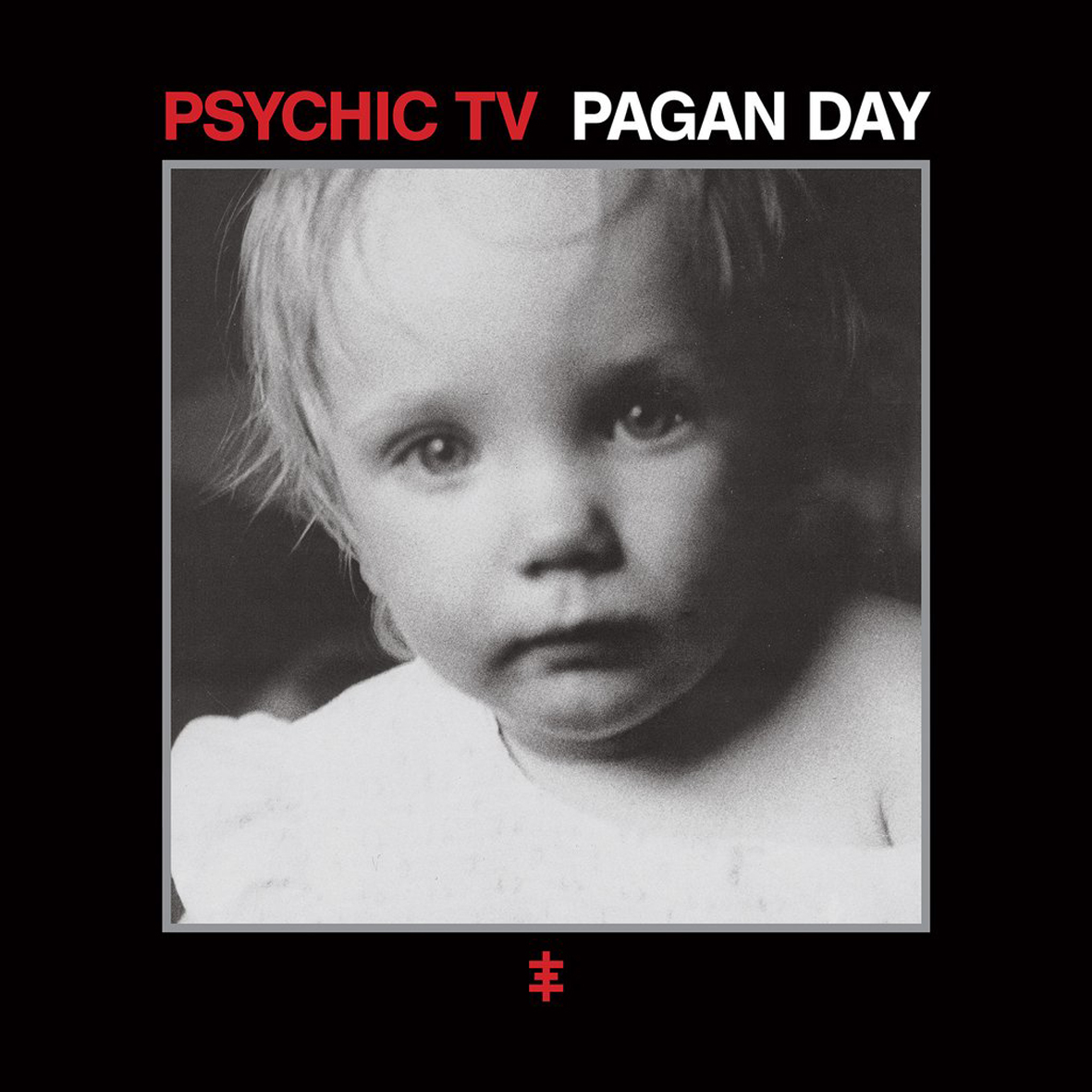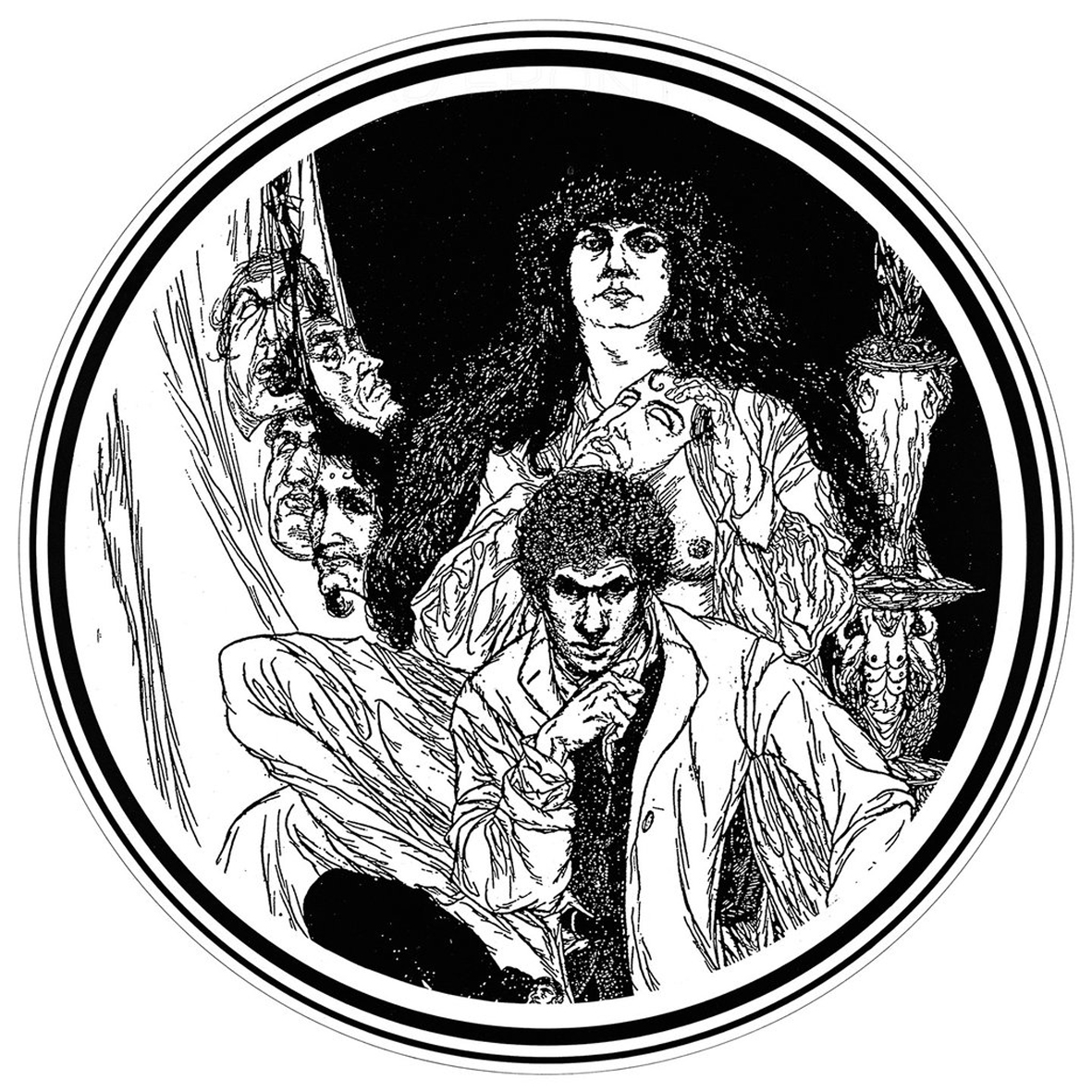 I have always viewed Psychic TV with a mixture of fascination and annoyance, as the project managed to assemble some of the most talented and idiosyncratic artists in underground music, but were far too erratic, scattershot, and over-prolific to ever turn their genuine flashes of brilliance into a great career.  That said, the founding duo of Genesis P-Orridge and Alternative TV's Alex Fergusson definitely started off strong and these two reissues roughly bookend that golden age.  Pagan Day, which first surfaced as an extremely limited release in 1984 (it was released December 24 and deleted on Christmas), is a collection of early 4-track sketches, several of which were later released in different form. The strange and uneven Allegory and Self from 1998, on the other hand, was perversely the band's pop breakthrough, featuring the half-annoying/half-subversive underground hit "Godstar" and whole lot that could never be chart-worthy.  Admittedly, there are a few moments of magic amidst that stylistic jumble, but the more polished ensemble work unexpectedly feels a bit less substantial than Pagan Day's rough-hewn creative outpouring (for good reason).
I have always viewed Psychic TV with a mixture of fascination and annoyance, as the project managed to assemble some of the most talented and idiosyncratic artists in underground music, but were far too erratic, scattershot, and over-prolific to ever turn their genuine flashes of brilliance into a great career.  That said, the founding duo of Genesis P-Orridge and Alternative TV's Alex Fergusson definitely started off strong and these two reissues roughly bookend that golden age.  Pagan Day, which first surfaced as an extremely limited release in 1984 (it was released December 24 and deleted on Christmas), is a collection of early 4-track sketches, several of which were later released in different form. The strange and uneven Allegory and Self from 1998, on the other hand, was perversely the band's pop breakthrough, featuring the half-annoying/half-subversive underground hit "Godstar" and whole lot that could never be chart-worthy.  Admittedly, there are a few moments of magic amidst that stylistic jumble, but the more polished ensemble work unexpectedly feels a bit less substantial than Pagan Day's rough-hewn creative outpouring (for good reason).
Psychic TV is a band that embodies quite an impressive array of curious paradoxes and surprises, but one of the more amusing ones is how much this incarnation seemed to be united by a genuine love of '60s pop.  Nowhere is this more apparent than on Pagan Day's surprise highlight, a gorgeous and sincere cover of The Rolling Stones' "As Tears Go By" with a very strange history.  For one, it is deceptively entitled "Farewell" and was first listed as a bonus track on the 1986 reissue, but...it was not actually on that album.  Instead, it turned up roughly a decade later on the Cleopatra reissue.  Also, it clearly features a number of people other than Fergusson and P-Orridge, but none are credited.  In any case, it is a perfect mix of lovely vocal harmonies, lush organ melodies, and an endearingly kitschy and ramshackle-sounding drum machine groove.  The less commercial side of the '60s also appears in the form of a credited and straightforward acoustic cover of Pearls Before Swine's "Translucent Carriages."  Later, "Baby’s Gone Away" sounds like a demo that could have been left on the cutting room floor from The Velvet Underground and Nico.  Yet another endearing and unexpected quirk of this era is how some of the best pieces are so simple and conventionally beautiful (a far cry from Throbbing Gristle).  My favorite song in that vein is "The Orchids" from Dreams Less Sweet, a song that appears here in embryonic form as "Cold Steel."  Sadly, "Cold Steel" is a bit too hurried and distracted-sounding to quite capture the beauty of its later incarnation (which was confusingly recorded later but released earlier).
That wide-eyed sincerity also arguably surfaces in the melancholy organ ballad "We Kiss," but the best songs that are not Rolling Stones covers tend to be the stranger and more experimental moments.  The lo-fi and exotic-sounding opener "Cadaques" is an appealing mix of propulsive disco grooves, Spanish-sounding surf guitar, and eerie minor key synths.  Later, the duo attempt similar fare with the dreamier "Alice," embellishing a pleasant and sunny synth melody with an insistent snare rhythm and amusingly intrusive "funky" bass playing.  It is quite a wonderfully charming and faintly absurd piece.  I like it.  The same is true of the ridiculous and driving "L.A.," which sounds like someone trying to clumsily compose a swaggering disco anthem on a cheap Farfisa in their bedroom.  Again: fine by me.  More legitimately great, however, is the stellar closer "New Sexuality," which sounds like a lost late-period Gristle classic, blending a hooky disco/synth pop groove with languorous deadpan vocals that do not quite conceal a hint of menace.  Unlike "Cold Steel," "New Sexuality" does not seem to have been reincarnated elsewhere, which is strange given that it was apparently a live staple.  I guess it did not need to be revisited, as the unpolished version here would be quite hard to top.  Characteristically, the rest of Pagan Day is consumed by jams, filler, and baffling missteps ("Opium" is a meandering and wrong-headed stab at the blues), but the messy charm, charisma, fun, and enthusiasm here handily outweigh the weaker moments (and a pair of legitimately great songs certainly does not hurt either).

As is amusingly apparent from the cover art of Allegory, Psychic TV's other big fascination from this period (besides the '60s) is the occult–the cover stars are Brian Jones and Austin Osmond Spare.  Those two fascinations make for strange bedfellows, especially when combined with the band's naked embrace of pop music here.  Notably, this was to be the last album involving Alex Fergusson, as P-Orridge became increasingly drawn towards electronic dance music and these sessions were plagued with larger, unrelated problems that fractured their union.  As such, Allegory and Self represents the swansong of an era, albeit quite an uneven one that seems to indicate that the group was already broken and lean on solid new material.  For one, two of Pagan Day's songs (not the best ones) are reprised in more polished and fleshed-out form ("We Kiss" and "Baby’s Gone Away") and one song is largely included for comic purposes (a piece sung by Genesis's daughter Caresse).  That said, "Caresse Song" does have kind of an outsider carnival-esque brilliance to it, marrying a stumbling one-finger calliope-esque organ to amusingly tuneless ramblings like "don't do what you want, do what I want cuz it’s not your house–it's my house."  The band seems to have a lot of trouble sticking to a direction even when they are not handing over the controls to a child though, as Allegory's remaining eight songs erratically veer from straightforward disco to '60s pop to polished electronic pop to snarling and noisy jams.  Some of those songs are quite good, but just as many feel very much half-baked.  It is fascinating that a band that set out to release 23 live albums in two years could have such a difficult time assembling a solid batch of songs for a third studio album: Allegory sounds like the work of three or four different bands, only one of which seems particularly focused on songwriting.
Obviously, no discussion of this album is complete without bringing up the Brian Jones-worship of "Godstar," but I am not overly fond of it myself.  It is certainly an interesting piece of music though, positing Jones as a brilliant martyr ("a lamb going to the slaughter") who was betrayed by his friends.  I like that it brazenly appropriates a Stones riff and hides an acidic commentary in very innocuous-sounding pop, but it still sounds like innocuous pop.  Much more compelling is the following "Just Like Arcadia," which is similarly upbeat and catchy, but features a bittersweetly beautiful chorus and some great vocal harmonies.  That penchant for strong vocal harmonies reappears in one of the other highlights, "Being Lost," which essentially sounds like a darkly beautiful Beach Boys cover (if they had organs, banjos, and a fascination with tarot cards). Elsewhere, both "She Was Surprised" and "Ballet Disco" sound like fairly straightforward stabs at instrumental disco, though the latter makes playfully exuberant use of stuttering samples, unusual percussion, and slap-and-pop bass riffage (presumably from Sharon "Mouse" Beaumont).  The rest of the album is considerably darker, messier, and quite spontaneous-sounding.  For example, "Thee Dweller" just sounds like a murky jam with jabbering vocals and werewolf howls and goes a long way towards explaining the many guests involved in this album (it would be very easy to hand a dozen people instruments and ask them to play (or howl) along).  Wolves and snarling, jabbering vocals are also a prominent component of the more formless "Southern Comfort," a piece that is not a far cry from a Halloween sound effects CD.  Much better (and less feral) is the howling and clattering "Starlit Mire," which feels like a darkly simmering slab of early post-punk (it borrows its name from a book illustrated by Spare, incidentally, ensuring maximum occultist cred).  Bizarrely, both "Starlit Mire" and "Thee Dweller" feel (and sound) live, which is a curious choice given the incredibly polished production of some other songs.
While it is far from the album’s best song, "Starlit Mire" goes a long way towards explaining Psychic TV's (anti-) cult following in the form of Thee Temple ov Psychick Youth, as Genesis sounds like a wild-eyed shaman imparting dark wisdom over a rapturously free-sounding cacophony.  I can certainly see the appeal of that, but I am much more a fan of good songs than I am of new messiahs, which means that Allegory's appeal for me lies primarily in the classic "Just Like Arcadia."  The liner notes for the Cleopatra reissue are quite helpful in elucidating exactly what went right and what went very wrong with this album: it was planned to be Psychic TV's masterpiece, as Genesis had a strong concept, a sympathetic producer (Ken Thomas), a vocal harmony wizard (Mickey Groome), and a #1 hit single on the UK indie charts all in place…until some drama with their manager left the band in financial ruin and unable to finish the album.  There are a handful of songs here that seem like they were meant for that magnum opus and completed during that initial surge of optimism, but the band's ill-timed flurry of hardships led to the departure of both Thomas and Fergusson, with the resultant and hobbled final product padded with demo tapes that Genesis was eventually able to locate in some boxes somewhere.  Consequently, this album represents the death rattle of Psychic TV’s first phase rather than its triumphant culmination, but it is not without a smattering of exquisite pleasures.
 
 
Read More

